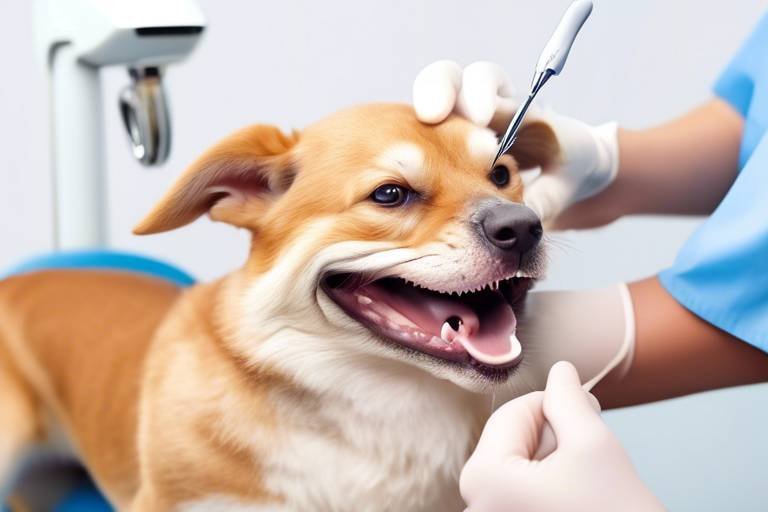How to Reduce Your Pet’s Risk of Heart Disease
As pet owners, we often see our furry friends as part of the family. Just like we take care of our own health, it’s crucial to look after their well-being too. One of the most significant health concerns for pets is heart disease. But don’t worry, there are effective strategies to help reduce the risk of this condition. In this article, we’ll dive into various methods that can help keep your pet’s heart healthy, including dietary changes, regular exercise, and routine vet visits. So, let’s embark on this journey to ensure our pets lead long, happy, and heart-healthy lives!
Heart disease can affect pets just as it does humans. It’s essential to recognize that not all heart conditions are the same. Some common types include congenital heart disease, where pets are born with heart defects, and acquired heart disease, which develops over time due to various factors like age, obesity, or infections. Symptoms can vary widely, but some signs to watch for include:
- Persistent coughing
- Difficulty breathing
- Fatigue or lethargy
- Loss of appetite
- Swelling in the abdomen or limbs
Being aware of these symptoms can help you act quickly and seek veterinary assistance when needed.
A nutritious diet plays a crucial role in maintaining your pet's heart health. Just like humans, pets need a balanced intake of essential nutrients to support their cardiovascular system. Key nutrients include omega-3 fatty acids, which help reduce inflammation and improve heart function. Additionally, antioxidants found in fruits and vegetables can combat oxidative stress, which is vital for heart health.
When it comes to pet food, not all options are created equal. Selecting high-quality pet food is vital for ensuring your pet receives the necessary nutrients. It's essential to read labels carefully. Look for foods that list real meat as the first ingredient and contain whole grains and vegetables. Pay special attention to the inclusion of omega-3 fatty acids, which can be found in fish oil or flaxseed. These ingredients can significantly contribute to your pet's heart health.
Now, let’s talk about the ongoing debate between homemade diets and commercial pet foods. Homemade diets can be tailored to your pet's specific needs, but they require careful planning to ensure they are nutritionally balanced. On the other hand, commercial pet foods are formulated to provide complete nutrition, but not all brands are created equal. It’s essential to do your research and consult your veterinarian to determine the best option for your pet's heart health.
Sometimes, a nutritious diet alone isn’t enough. Exploring various supplements can enhance heart health in pets. For example, Coenzyme Q10 and taurine are known to support heart function. Always consult your veterinarian before introducing any new supplements to your pet’s diet to ensure their safety and effectiveness.
Physical activity is essential for a pet’s overall health, especially for maintaining a healthy heart. Regular exercise helps keep your pet's weight in check and strengthens their cardiovascular system. Activities like walking, playing fetch, or even engaging in interactive games can make a world of difference. Aim for at least 30 minutes of exercise daily, adjusting based on your pet's age and health status.
Regular vet visits are crucial for early detection of heart disease. These check-ups allow your veterinarian to monitor your pet’s heart health and catch any potential issues before they become serious. During these visits, your vet may recommend screenings such as blood tests or echocardiograms to assess your pet’s heart function.
Being aware of early signs of heart disease can lead to timely intervention. Keep an eye out for symptoms such as:
- Increased coughing, especially at night
- Rapid or labored breathing
- Fainting or collapsing
- Swollen abdomen
By recognizing these signs early, you can seek veterinary care promptly and improve your pet’s chances of a successful treatment.
Some breeds are predisposed to heart disease, making it essential to understand your pet's genetic risks. Breeds such as Boxers, Cavalier King Charles Spaniels, and Doberman Pinschers are known to have higher incidences of heart conditions. Regular screenings can help identify potential issues early on, allowing for preventive care tailored to your pet’s specific needs.
Q: Can heart disease be prevented in pets?
A: While not all heart diseases can be prevented, maintaining a healthy diet, regular exercise, and routine vet visits can significantly reduce the risk.
Q: What are the signs that my pet might have heart disease?
A: Look for symptoms such as coughing, difficulty breathing, lethargy, and swelling in the abdomen. If you notice any of these signs, consult your veterinarian.
Q: Is it better to feed my pet homemade food or commercial food?
A: Both options have their pros and cons. Homemade diets can be tailored to specific needs but require careful planning. Commercial foods are convenient but should be chosen wisely. Consult your vet for personalized advice.
Q: How often should my pet have check-ups?
A: Ideally, pets should have a vet check-up at least once a year. Older pets or those with health issues may need more frequent visits.

Understanding Heart Disease in Pets
Heart disease is not just a human ailment; it can affect our beloved pets as well. Just like us, pets can suffer from a variety of heart conditions that can lead to serious health issues if not addressed promptly. It's essential for pet owners to be aware of the types of heart disease that can affect their furry friends and the symptoms to watch for. Understanding these factors can be the key to ensuring a long, healthy life for your pet.
There are several types of heart disease that are commonly seen in pets, including:
- Congenital Heart Disease: This type is present at birth and can affect the structure of the heart, leading to complications later in life.
- Acquired Heart Disease: This can develop over time due to factors such as age, obesity, or other health problems.
- Valvular Heart Disease: Often seen in older dogs, this condition affects the heart valves and can lead to heart failure.
- Cardiomyopathy: This is a disease of the heart muscle that can affect its ability to pump blood effectively.
Symptoms of heart disease in pets can be subtle at first, making it crucial for owners to be vigilant. Some common signs to look out for include:
- Excessive coughing, especially at night or after exercise
- Difficulty breathing or rapid breathing
- Fatigue or lethargy, especially during playtime
- Swelling in the abdomen or limbs
- Loss of appetite or sudden weight loss
- Fainting or collapsing episodes
Recognizing these symptoms early on can make a significant difference in the treatment and management of heart disease. If you notice any of these signs, it's essential to consult your veterinarian as soon as possible. They can conduct a thorough examination and recommend appropriate tests, such as X-rays or echocardiograms, to determine the health of your pet's heart.
In summary, understanding heart disease in pets involves being aware of the types of conditions that can arise and recognizing the symptoms that may indicate a problem. By staying informed and proactive, you can help ensure that your pet remains healthy and happy for years to come.

Importance of a Balanced Diet
A nutritious diet plays a crucial role in maintaining your pet's heart health. Just like humans, pets require a balanced intake of vitamins, minerals, proteins, fats, and carbohydrates to function optimally. Imagine your pet's body as a finely tuned machine; if you feed it the right fuel, it will run smoothly and efficiently. However, if you neglect its dietary needs, it's like putting low-quality gasoline in a high-performance car—it just won't perform at its best.
Heart disease in pets can often be linked to poor nutrition, making it vital for pet owners to understand what constitutes a balanced diet. Essential nutrients such as omega-3 fatty acids, antioxidants, and fiber are particularly beneficial for cardiovascular health. Omega-3 fatty acids, for example, can help reduce inflammation and improve blood circulation, which is crucial for a healthy heart. You can find these beneficial fats in fish oils and certain types of fish, like salmon and sardines.
When selecting food for your pet, it’s important to read the labels carefully. Many commercial pet foods contain fillers and artificial additives that do little to support heart health. Instead, look for foods that list whole ingredients, such as real meat, vegetables, and grains, as their primary components. Here’s a quick breakdown of what to look for:
| Nutrient | Benefits | Sources |
|---|---|---|
| Omega-3 Fatty Acids | Reduce inflammation and support heart function | Fish oil, flaxseed oil, salmon |
| Antioxidants | Combat oxidative stress and support overall health | Fruits (like blueberries), vegetables (like spinach) |
| Fiber | Promotes healthy digestion and weight management | Whole grains, vegetables |
Now, let’s talk about the debate between homemade diets and commercial foods. Each option has its pros and cons. Homemade diets allow you to control every ingredient, ensuring your pet gets the best quality food. However, crafting a balanced meal that meets all your pet's nutritional needs can be tricky. On the other hand, commercial pet foods are formulated to provide complete nutrition, but the quality can vary widely. It’s essential to do your research and choose a reputable brand.
In addition to regular pet food, consider incorporating supplements into your pet's diet to further enhance heart health. Supplements like taurine, coenzyme Q10, and certain vitamins can provide additional support. However, always consult your veterinarian before adding any new supplements to ensure they are appropriate for your pet’s specific needs.
In conclusion, a balanced diet is not just a matter of feeding your pet; it's about nourishing their heart and overall well-being. By paying attention to what goes into their bowl, you can significantly reduce the risk of heart disease and help your furry friend live a longer, healthier life.
- What are the signs of heart disease in pets? Common symptoms include coughing, difficulty breathing, lethargy, and a decreased appetite.
- Can I feed my pet a vegetarian diet? While some pets can thrive on a vegetarian diet, it’s essential to ensure they receive all necessary nutrients, possibly with the help of supplements.
- How often should I take my pet to the vet? Regular check-ups are recommended at least once a year, but more frequent visits may be necessary for older pets or those with existing health issues.
Choosing the Right Food
When it comes to your pet's heart health, is akin to selecting the best fuel for a high-performance engine. Just like you wouldn’t put low-grade gasoline in a sports car, you shouldn’t compromise on your pet’s nutrition. The right diet can make a world of difference in maintaining their cardiovascular system and overall well-being. But how do you know what’s truly beneficial? Let’s break it down.
First, it’s essential to understand the key components that contribute to a healthy diet. Look for foods rich in lean proteins, whole grains, and fresh vegetables. These ingredients provide the necessary nutrients that not only support heart health but also keep your pet's weight in check—an important factor since obesity can exacerbate heart conditions. Additionally, omega-3 fatty acids are particularly beneficial for heart health. They can help reduce inflammation and improve blood circulation. So, when scanning the labels of pet food, you should specifically look for:
- Salmon or fish meal as a protein source
- Whole grains like brown rice or oats
- Fruits and vegetables such as blueberries, spinach, and sweet potatoes
But don’t just grab any bag off the shelf. It’s crucial to read the labels carefully. A high-quality pet food should list a specific meat source as the first ingredient, rather than vague terms like "meat by-products." This ensures your pet is getting real protein instead of fillers that could lead to weight gain and other health issues. Additionally, be cautious of foods high in sodium, as excess salt can strain the heart.
Now, you might wonder, “Should I go for homemade diets or stick with commercial pet foods?” This is a common dilemma among pet owners. Homemade diets can be tailored to meet your pet's specific needs, but they require careful planning to ensure they are nutritionally balanced. On the other hand, high-quality commercial foods are formulated to provide the right mix of nutrients without the hassle of preparation. Both options have their pros and cons, and it ultimately depends on your lifestyle and your pet's specific needs.
Lastly, let’s not forget about supplements. Incorporating supplements into your pet's diet can further enhance heart health. For instance, fish oil supplements are a great source of omega-3 fatty acids, while taurine is an amino acid that can support heart function. However, always consult your veterinarian before introducing any new supplements to ensure they’re safe and appropriate for your pet.
In summary, choosing the right food for your pet is a crucial step in reducing their risk of heart disease. By focusing on high-quality ingredients, monitoring their weight, and considering supplements, you can help keep your furry friend’s heart healthy and strong for years to come.
Q: How can I tell if my pet's food is high quality?
A: Look for specific meat sources as the first ingredient, avoid foods with fillers, and check for the presence of whole grains, fruits, and vegetables.
Q: Are homemade diets better than commercial foods?
A: Both have their advantages. Homemade diets can be customized, but commercial foods are formulated to meet nutritional standards. Consult your vet to determine the best option for your pet.
Q: Should I consider supplements for my pet?
A: Yes, supplements like fish oil and taurine can be beneficial for heart health. Always consult your veterinarian before adding any supplements to your pet’s diet.
Homemade Diets vs. Commercial Foods
When it comes to feeding our furry friends, the debate between homemade diets and commercial foods often sparks passionate discussions among pet owners. Each option has its own set of advantages and disadvantages, and understanding these can help you make the best choice for your pet’s heart health. Homemade diets can provide a level of control over ingredients that commercial foods simply cannot. You can select fresh, high-quality ingredients tailored specifically to your pet’s needs. This means you can avoid fillers, artificial preservatives, and other additives that might be present in store-bought foods. However, creating a balanced homemade diet requires careful planning and knowledge of your pet’s nutritional requirements.
On the flip side, commercial pet foods are formulated to meet the nutritional standards set by veterinary associations, making them convenient and often more affordable. They offer a variety of options, from dry kibble to wet food, catering to different preferences and dietary needs. Many brands also provide specialized formulas designed for specific health issues, including heart health. Yet, not all commercial foods are created equal; some may contain low-quality ingredients that could negatively impact your pet's health.
To help you weigh your options, consider the following factors:
- Ingredient Quality: Look for high-quality proteins and whole food ingredients in both homemade and commercial diets.
- Balanced Nutrition: Ensure that whatever diet you choose meets the essential nutrient requirements for your pet.
- Convenience: Homemade diets require preparation time, while commercial foods offer quick and easy feeding solutions.
- Cost: Homemade diets can sometimes be more expensive due to the cost of fresh ingredients, while commercial foods often provide more economical options.
Ultimately, the choice between homemade diets and commercial foods should be based on your pet’s specific health needs, lifestyle, and your ability to provide a balanced diet. Consulting with your veterinarian can provide valuable insights tailored to your pet's unique situation. They can help you evaluate whether a homemade diet could be beneficial or if a high-quality commercial food would be more appropriate for maintaining your pet's heart health.
1. Can I mix homemade food with commercial food?
Yes, many pet owners choose to mix both to provide variety and ensure balanced nutrition. However, it’s essential to consult your vet to avoid nutritional imbalance.
2. How can I ensure my homemade diet is balanced?
You can consult a veterinary nutritionist to create a balanced recipe or use resources that provide guidelines for pet nutrition.
3. Are there specific brands of commercial food that are better for heart health?
Look for brands that use high-quality ingredients and have formulas specifically designed for heart health. Your vet can recommend reputable brands.
4. How do I transition my pet to a new diet?
Gradually introduce the new food over a week or so, mixing it with the current food to prevent digestive upset.
Supplements for Heart Health
When it comes to keeping your furry friend’s heart ticking strong, supplements can play a significant role. Just like how we might take vitamins to boost our health, pets can benefit from certain additives that support cardiovascular function. But what should you consider when thinking about supplements for your pet? Let’s dive into the world of heart health supplements and understand their importance.
First off, Omega-3 fatty acids are often hailed as the superheroes of heart health. Found in fish oil and certain algae, these fatty acids can help reduce inflammation and lower the risk of heart disease. They work by improving blood flow and lowering triglyceride levels, which is crucial for maintaining a healthy heart. If your pet struggles with weight issues or has existing heart conditions, incorporating Omega-3s into their diet may be a game changer. Just imagine it as giving your pet's heart a refreshing swim in a cool ocean!
Another supplement to consider is Coenzyme Q10 (CoQ10). This powerful antioxidant plays a vital role in energy production within heart cells. It’s like the fuel that keeps your pet’s heart engine running smoothly. CoQ10 has been shown to improve heart function, especially in dogs with congestive heart failure. If your pet is getting older or has a genetic predisposition to heart issues, discussing CoQ10 with your veterinarian could be beneficial.
Taurine, an amino acid, is also essential for heart health, particularly in certain breeds like Cocker Spaniels and Boxers. A deficiency in taurine can lead to dilated cardiomyopathy, a serious heart condition. Ensuring your pet gets enough taurine through their diet or supplements can help keep their heart strong and functioning optimally.
However, it’s crucial to remember that not all supplements are created equal. Always consult with your veterinarian before introducing any new supplement to your pet’s routine. They can help you determine the right dosage and ensure that the supplement will not interfere with any medications your pet may already be taking. Think of your vet as your pet's personal trainer, guiding them towards the best health decisions!
In summary, while a balanced diet and regular exercise are foundational for your pet's heart health, supplements can provide that extra boost. Omega-3 fatty acids, CoQ10, and taurine are just a few examples of how you can enhance your pet's cardiovascular health. Remember, a healthy heart leads to a happy pet, and ultimately, a happy you!
- What are the signs that my pet might need heart supplements? Look out for lethargy, difficulty breathing, or coughing. If you notice any of these symptoms, consult your vet.
- Can I give my pet human supplements? Not all human supplements are safe for pets. Always consult your veterinarian before giving your pet any supplements.
- How do I know which supplements are right for my pet? The best way is to have a discussion with your veterinarian, who can recommend based on your pet’s specific needs.
Regular Exercise and Its Benefits
Just like us humans, our furry friends need to stay active to maintain a healthy heart. Regular exercise is not just about keeping your pet in shape; it’s a fundamental part of their overall well-being. Think of exercise as a magic potion that can boost your pet's heart health, enhance their mood, and even extend their lifespan! But how much exercise does your pet really need? The answer can vary based on age, breed, and health status.
Engaging in physical activity helps to strengthen your pet's heart muscle, improve circulation, and reduce the risk of obesity, which is a significant contributor to heart disease. For instance, a dog that goes for brisk walks or enjoys a game of fetch is not only burning calories but also keeping their cardiovascular system in tip-top shape. Similarly, cats that play with toys or engage in climbing activities can also reap the heart-healthy benefits of exercise.
Here are some fun and effective ways to keep your pet active:
- Daily Walks: Aim for at least 30 minutes of walking each day. This not only gets their heart pumping but also provides mental stimulation from all the new sights and smells.
- Playtime: Interactive play, whether it's chasing a ball or playing tug-of-war, can be a great way to bond while keeping your pet active.
- Agility Training: Setting up an obstacle course in your backyard or taking agility classes can be a fun way for dogs to exercise.
- Cat Trees and Toys: For our feline friends, investing in a cat tree or engaging them with laser pointers can encourage them to jump and climb, giving them a good workout.
But remember, before starting any new exercise regimen, it’s crucial to consult with your veterinarian, especially if your pet has pre-existing health conditions. They can provide personalized recommendations based on your pet's specific needs. Additionally, always pay attention to your pet's signals. If they seem tired or reluctant to continue, it's important to respect their limits.
Incorporating regular exercise into your pet's routine can also improve their mental health. A tired pet is often a happy pet! Exercise releases endorphins, which can help alleviate anxiety and stress, making your pet more relaxed and content. So, not only are you helping their heart, but you're also boosting their mood.
In conclusion, regular exercise is a cornerstone of heart health for pets. It’s about creating a lifestyle that promotes activity and engagement. Whether it’s a long walk in the park or an interactive play session at home, every bit counts. So grab that leash or toy, and let’s get moving!
Q: How much exercise does my pet need daily?
A: Generally, dogs need about 30 minutes to 2 hours of exercise daily, while cats can benefit from at least 15-30 minutes of playtime. However, this can vary based on breed and age.
Q: What signs should I look for to know if my pet is over-exercising?
A: Signs of over-exercising include excessive panting, lethargy, limping, or reluctance to continue exercising. Always monitor your pet and adjust their activity level as needed.
Q: Can exercise help with my pet's weight management?
A: Absolutely! Regular exercise, combined with a balanced diet, can help maintain a healthy weight, which is crucial for preventing heart disease.
Q: Are there specific exercises for older pets?
A: Yes! Older pets may benefit from low-impact activities like gentle walks or swimming, which can be easier on their joints while still providing cardiovascular benefits.

Routine Veterinary Check-ups
When it comes to your furry friend’s health, routine veterinary check-ups are like a superhero cape—essential for protection and prevention! Just like we humans go for annual physicals to catch any lurking health issues, our pets need the same kind of attention. Regular vet visits can help in the early detection of heart disease, which is crucial because the sooner you catch it, the better the outcome. Think of it as a preventive measure, much like putting on sunscreen to avoid sunburn.
During these check-ups, your veterinarian will perform a comprehensive evaluation that includes checking your pet's weight, heart rate, and overall physical condition. They might also recommend blood tests and other screenings to assess your pet's heart health. These routine evaluations can uncover underlying conditions that might not be immediately visible. For instance, heart murmurs or irregular heartbeats can often go unnoticed without a vet’s keen eye.
Furthermore, the frequency of these check-ups can vary based on your pet's age and health status. Generally, young and healthy pets should visit the vet at least once a year, while older pets or those with existing health issues may require more frequent visits. Here’s a simple guideline:
| Age of Pet | Recommended Check-up Frequency |
|---|---|
| Puppies/Kittens (0-1 year) | Every 3-4 months |
| Adults (1-7 years) | Once a year |
| Senior Pets (7+ years) | Every 6 months |
Keeping track of your pet's health history is also a vital part of the check-up process. If your pet has had any previous health issues, make sure to discuss these with your vet. This information can help them tailor a specific health plan for your pet, which may include heart health monitoring. Remember, your vet is your partner in your pet's healthcare journey, so don’t hesitate to ask questions or express concerns.
In addition to physical examinations, vets often discuss lifestyle factors that can impact heart health, such as diet and exercise. They may provide personalized recommendations to help you make informed decisions about your pet's nutrition and activity levels. After all, a well-rounded approach to health is key to keeping your pet's heart ticking strong!
In summary, routine veterinary check-ups are not just a formality; they are a fundamental part of preventive care that can significantly reduce the risk of heart disease in your pets. By staying proactive and committed to regular visits, you’re not just ensuring your pet’s health today but also paving the way for a longer, happier life together.
- How often should I take my pet to the vet?
It depends on your pet's age and health status. Generally, young pets should go every 3-4 months, adults once a year, and seniors twice a year. - What should I expect during a routine check-up?
Your vet will perform a physical exam, check vital signs, and may recommend blood tests to assess your pet's overall health. - Can I ask my vet about my pet's diet during the check-up?
Absolutely! Discussing nutrition is a crucial part of maintaining your pet's heart health.
Recognizing Early Symptoms
Being a pet owner is a rewarding experience, but it also comes with the responsibility of keeping a close eye on your furry friend’s health. Just like humans, pets can show early signs of heart disease that can often be overlooked. It's essential to know what to look for. Early detection can be the key to effective treatment and a longer, healthier life for your pet. So, what should you be on the lookout for?
One of the most common early symptoms of heart disease in pets is increased lethargy. If your pet seems less energetic than usual, it might be a sign that something is wrong. You may notice them playing less, sleeping more, or simply not showing their usual enthusiasm for walks or playtime. Another crucial indicator is changes in appetite. A sudden decrease in food intake or an unusual disinterest in their favorite treats can be a red flag.
Additionally, keep an eye out for coughing or difficulty breathing. If your pet starts to cough frequently or seems to struggle for breath, especially after exertion, these could be symptoms of heart issues. You might also notice weight loss or, conversely, unexplained weight gain. Both can indicate underlying health problems, including heart disease.
Moreover, changes in behavior are significant. If your pet becomes more irritable or anxious, or if they start to hide away more than usual, these behavioral shifts can signal discomfort or distress associated with heart conditions. It's also important to monitor for swelling in the abdomen or limbs. This can be a sign of fluid buildup due to heart failure.
To help you recognize these symptoms, here’s a quick reference table:
| Symptom | Description |
|---|---|
| Increased Lethargy | Less energy, more sleeping, decreased interest in activities. |
| Changes in Appetite | Sudden decrease in food intake or disinterest in treats. |
| Coughing or Difficulty Breathing | Frequent cough or struggle to breathe after exertion. |
| Weight Changes | Unexplained weight loss or gain. |
| Behavioral Changes | Increased irritability, anxiety, or hiding behavior. |
| Swelling | Fluid buildup in the abdomen or limbs. |
Recognizing these early symptoms can make a significant difference in your pet's health. If you notice any of these signs, it’s crucial to consult your veterinarian as soon as possible. They can perform a thorough examination and, if necessary, conduct tests to determine if your pet is suffering from heart disease. Remember, your vigilance can lead to timely intervention, potentially saving your pet's life.
Here are some common questions pet owners have regarding heart disease:
- What breeds are most at risk for heart disease? Certain breeds, such as Cavalier King Charles Spaniels and Boxers, are more predisposed to heart conditions.
- Can heart disease be prevented? While not all cases can be prevented, maintaining a healthy diet, regular exercise, and routine vet check-ups can significantly reduce risks.
- How often should my pet see the vet? Regular check-ups at least once a year are recommended, but older pets or those with health issues may need more frequent visits.

Genetic Factors and Screening
When it comes to our beloved pets, understanding genetic factors is crucial in the fight against heart disease. Just like humans, certain breeds of dogs and cats are more susceptible to heart conditions due to their genetic makeup. For instance, breeds such as Boxers, Doberman Pinschers, and German Shepherds have a higher predisposition to specific heart diseases like cardiomyopathy. This means that as a responsible pet owner, you must be aware of these risks and take proactive measures to mitigate them.
One effective way to address these genetic predispositions is through screening. Regular veterinary check-ups should include heart health assessments, especially for breeds known to be at risk. During these visits, veterinarians can perform various diagnostic tests, such as echocardiograms or electrocardiograms, to evaluate your pet's heart function. Early detection can be a game-changer, allowing for timely intervention that can significantly improve your pet's quality of life.
Moreover, understanding your pet's family history can provide valuable insights. If your pet comes from a lineage with a history of heart disease, it’s even more critical to stay vigilant. You might want to consider discussing with your vet about a tailored screening schedule based on your pet’s breed and family background. For example, a young dog from a breed known for heart issues might need an early screening at just a year old, while others may not require it until they are older.
In addition to regular screenings, educating yourself about the signs of heart disease can empower you to act quickly. Here are some common symptoms to watch for:
- Excessive coughing
- Difficulty breathing or rapid breathing
- Fatigue or lethargy
- Loss of appetite or weight loss
- Swollen abdomen
If you notice any of these symptoms, don’t hesitate to consult your veterinarian. Remember, your pet relies on you to be their advocate, and being informed is the first step in ensuring their heart stays healthy.
In conclusion, while genetics play a significant role in your pet's risk of heart disease, proactive measures such as regular screenings and being alert to symptoms can make all the difference. By understanding these genetic factors, you can take informed steps to protect your furry friend from heart-related issues.
Q: How often should my pet be screened for heart disease?
A: The frequency of screenings can depend on your pet's breed, age, and family history. Generally, it's advisable to discuss a tailored schedule with your veterinarian.
Q: Are there specific breeds that are more prone to heart disease?
A: Yes, breeds like Boxers, Doberman Pinschers, and Cavalier King Charles Spaniels are known to have a higher risk of heart conditions.
Q: What are the early signs of heart disease in pets?
A: Early signs can include excessive coughing, difficulty breathing, lethargy, loss of appetite, and a swollen abdomen.
Q: Can diet and exercise help reduce the risk of heart disease?
A: Absolutely! A balanced diet and regular exercise are crucial in maintaining your pet's heart health and overall well-being.
Frequently Asked Questions
- What are the common signs of heart disease in pets?
Heart disease can be sneaky! Look out for symptoms like persistent coughing, difficulty breathing, fatigue, and a decreased appetite. If your furry friend seems unusually lethargic or struggles with activities they used to enjoy, it’s time to consult your vet.
- How can I improve my pet's diet for better heart health?
Feeding your pet a balanced diet is key! Opt for high-quality commercial foods that list meat as the first ingredient. Incorporate omega-3 fatty acids, found in fish oil, and consider fresh fruits and vegetables as healthy treats. Always check with your vet before making significant dietary changes.
- Is exercise really that important for my pet's heart health?
Absolutely! Just like us, pets need regular exercise to keep their hearts strong. Daily walks, playtime, and interactive toys can significantly improve their cardiovascular health. Think of it as a fun way to bond while keeping them fit!
- How often should I take my pet to the vet for check-ups?
Routine vet visits are essential! Ideally, you should schedule check-ups at least once a year for young, healthy pets. For older pets or those with health issues, biannual visits may be necessary to catch any potential heart problems early.
- Can I give my pet supplements for heart health?
Yes, but with caution! There are various supplements available that can support heart health, such as taurine and omega-3 fatty acids. Always consult your veterinarian before introducing any new supplements to ensure they’re safe and appropriate for your pet's specific needs.
- Are certain breeds more prone to heart disease?
Yes, some breeds are genetically predisposed to heart conditions. Breeds like Cavalier King Charles Spaniels, Boxers, and Doberman Pinschers are known to be at higher risk. Understanding your pet's breed can help you take proactive steps in monitoring their heart health.
- What should I do if I notice symptoms of heart disease in my pet?
Don’t wait! If you observe any symptoms of heart disease, contact your veterinarian immediately. Early detection can make a significant difference in your pet’s treatment options and overall prognosis.



















